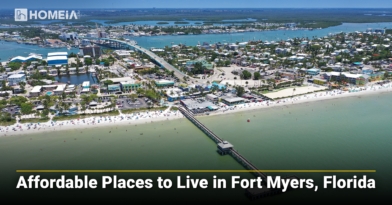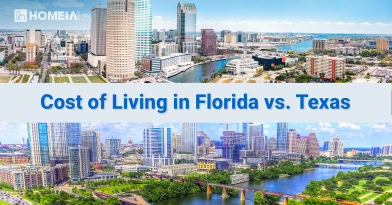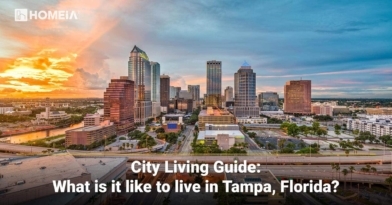Moving to Florida: THE Complete Relocation Guide and Checklist
- Local Editor:Local Editor: Scott Koskoski
Published: Jul 14, 2025
- Category: City Living Guide
Hey there! If you’re reading this, you must be thinking about making the move from Massachusetts to Florida. You’re not alone—thousands of folks from the Bay State flock south every year, drawn by the promise of endless sunshine, white sandy beaches, and a more relaxed, tropical way of life. As someone who lived in Massachusetts for years and has helped plenty of friends and family make the move, I can tell you, Florida’s got a lot to offer. But I can also tell you it’s not all palm trees and perfect weather—there’s a lot to consider before you pack up and head to the Sunshine State. So let’s get into it!
This comprehensive Florida moving guide is your definitive one-stop resource for everything you need to know before you make the 1,200-mile leap—from a cost-of-living breakdown and job market analysis to a rundown of the best places to live, along with tips for settling in. Whether you’re dreaming of Miami’s vibrant lights and life, Orlando’s family-friendly suburbs, or the laid-back charm of St. Augustine, or anywhere else between 30A and A1A, we’ll help you make an informed decision about your Florida relocation.
Topic Table: How This Guide Helps You Relocate to Florida
| Topic Area | How This Guide Helps You |
| Research & Planning | Gives you the inside scoop on Florida cities, living costs, neighborhoods, and what to expect when you move. |
| Financial Preparedness | Helps you budget for Florida cost of living and get your finances ready for Sunshine State living. |
| Legal & Documentation | Walks you through Florida residency requirements, vehicle registration, and essential paperwork you need. |
| Community Integration | Tips for making friends, finding local resources, and feeling at home in your new Florida neighborhood. |
| Ongoing Support | Answers your relocation questions and provides comprehensive checklists for every step of your Florida move. |
10 Most Affordable Places to Live in Florida: Discovering Florida’s Hidden Gems
Florida, known for its sunny beaches, vibrant culture and diverse communities, is a dream destination for many. But living in this paradise doesn’t have to break the bank. In this article, we’ll explore some of the most affordable places in Florida that offer a great quality of life without the hefty price tag…
Table of Contents:
- 1. What is it REALLY Like to Live in Florida?
- 2. Florida’s Cost of Living & Affordability
- 3. Florida’s Economy and Career Opportunities
- 4. Florida’s Tradition of Educational Excellence
- 5. Florida’s Tax Structure Offers Major Financial Benefits
- 6. Best Places to Live: A Comprehensive City Guide
- A. Miami: Urban Sophistication and International Beach Life
- B. Orlando: Family-Friendly and Theme Park Central
- C. Tampa: Affordable Urban Living and Growing Economy
- D. St. Petersburg: Artsy and Relaxed Waterfront Living
- E. Jacksonville: Big City Amenities with Small-Town Feel
- F. Naples: Upscale Luxury and Resort-Style Living
- 7. Planning Your Massachusetts-to-Florida Move: A Detailed Timeline
- 8. Settling In: Practical Essentials for New Floridians
- 9. Florida’s Unique Rules and Requirements
- 10. Financial Adjustments and Budgeting for Florida Living
- Ready to Go? Your Florida Adventure Awaits!
- Moving to Florida: Some FAQs
1. What is it REALLY Like to Live in Florida?
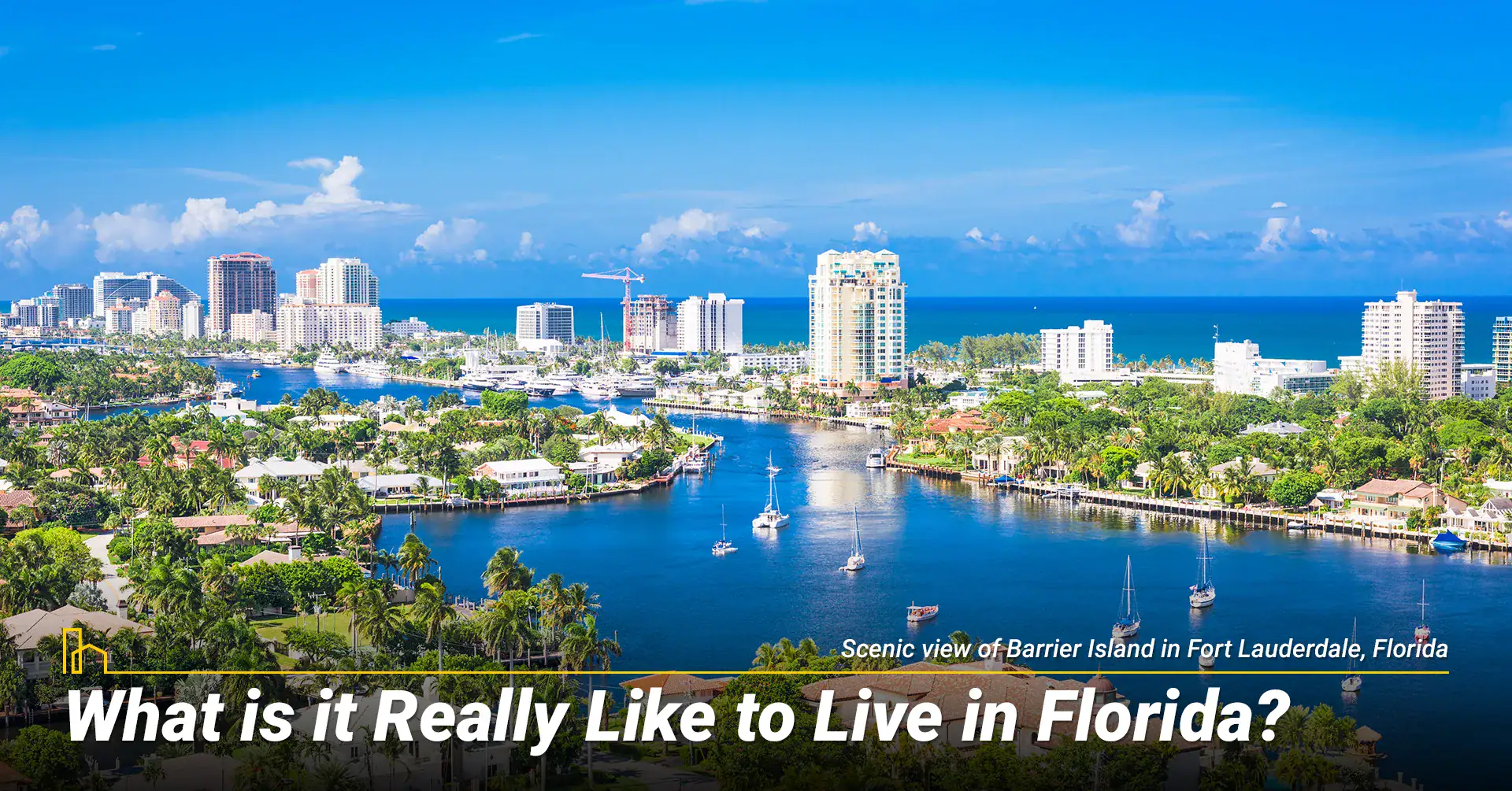
A. Culture & Lifestyle
Coming from Massachusetts, you’ll notice right away that Florida is more than just 1,200 miles away – it’s in many ways a world apart. The pace tends to be slower, the people tend to be friendlier, and the weather tends to be—well, let’s just say you won’t be shoveling snow again anytime soon. But Florida isn’t full of retirees and theme parks. It’s a vibrant, increasingly diverse state with a global mix of cultures, languages, and traditions that make it one of the most dynamic places to live in America.
Many Floridians are just like you – from somewhere else! According to recent Census data, only 36 percent of Sunshine State residents are natives. They are proud of their adopted home and excited to welcome newcomers with open arms. You’ll find a strong sense of community, especially in smaller towns and suburban neighborhoods. But even in big metropolitan areas like Miami, Tampa-St. Pete, and Orlando, there’s a laid-back, relaxed vibe that’s hard to resist and easy to adapt to. Whether you’re at a beachside café in Naples or a farmers’ market in Gainesville, you’ll quickly feel at home in this welcoming Southern atmosphere.
B. The Foodie Scene: Sunshine State Flavors and Culinary Diversity
If your major food groups included New England clam chowder and Boston cream pie, your newfound Florida palate is in store for a whole new world of flavors. Florida’s food scene is truly global, although heavily influenced by a melting pot of Caribbean, Latin American, Southern, and coastal flavors that reflects the state’s incredible cultural diversity. The year-round growing season and coastal location mean optimal access to fresh seafood, tropical fruits and native citrus, and farm-to-table dining experiences that rival any culinary destination.
Get your stomach up to speed on these must-try local Florida dishes that define Sunshine State cuisine:
- Key Lime Pie, the official state pie, made with tangy native key limes, meringue, and a buttery graham cracker crust that originated in the Florida Keys, with many purveyors in Key West claiming to be the birthplace of this famous dessert.
- Cuban Sandwiches, a Miami staple, piled high with roast pork, ham, Swiss cheese, pickles, and mustard on Cuban bread…the best are found in the Little Havana neighborhood.
- Stone Crab Claws, a seasonal delicacy from mid-October to May, are usually served with tangy mustard sauce and require special tools to open and serve.
- Gator Bites, fried alligator meat that tastes like chicken—don’t knock it till you try it, and the best ones are often round at roadside stands!
- Conch Fritters, a taste of the Caribbean that’s popular throughout the Florida Keys and coastal areas, helped give Key West its “Conch Republic” nickname.
You’ll also find incredible local fresh seafood including grouper, mahi-mahi, and snapper, tropical fruits like mangoes and avocados, some of the world’s best citrus such as limes and Florida Oranges, and farm-to-table restaurants showcasing Florida’s agricultural bounty. And if you’re missing your old New England favorites, don’t worry—there are more than a few places that serve decent lobster rolls!
10 Key Things to Know About Living in Florida. Embracing the Sunshine State
In this comprehensive guide, we delve into 10 key aspects of living in Florida. These include the state’s climate, its diverse natural and cultural landscapes, economic considerations (like the lack of state income tax), the reality of hurricanes and weather-related concerns, and the particularities of its real estate market. We also explore the outdoor lifestyle…
C. Festivals, Music, and the Arts Scene
Florida has a thriving arts and culture scene that goes far beyond Central Florida’s famous theme parks and tourist attractions. Miami, quickly becoming a new global capital for culture, is internationally recognized for its world-class art galleries and museums, including the renowned Pérez Art Museum, the Frost science museum, the Vizcaya Gardens and the iconic Wynwood Walls street fashion and art district in Midtown. Orlando and Tampa have vibrant theater and music scenes, with everything from touring Broadway shows to indie rock bands performing at intimate venues, such as the Dr. Phillips Center in Orlando and Jannus Live in Tampa.
Cultural festivals and events are a major part of Florida’s lifestyle throughout the year. Some highlights include Art Basel Miami Beach each December, one of the most prestigious international art shows in the world attracting collectors and celebs alike (Leonardo DiCaprio is a reoccurring attendee); Gasparilla Pirate Festival, Tampa’s legendary annual pirate-themed parade and celebration; Epcot International Food & Wine Festival, a must-visit event for foodies and Disney enthusiasts; Florida Strawberry Festival in Plant City, celebrating the state’s agricultural heritage; Fantasy Fest, a Key West October tradition featuring wild parades, parties and costumes; and Calle Ocho Festival in Miami, a massive Latin music and culture street party that showcases the city’s Hispanic heritage.
D. Outdoor Life & Recreation
If you love the great outdoors, you’ll feel right at home in Florida’s natural paradise, except you won’t need that Massachusetts parka! The Sunshine State boasts more than 1,300 miles of pristine coastline, 175 state parks, and countless lakes, rivers, trails, and natural springs that offer year-round outdoor recreation opportunities. Here are a few ways to enjoy Florida’s environment:
- Beaches range from the powdery white sugar sands of the Emerald Coast Panhandle to the abundant shelling up and down the Gulf Coast to the lively, vibrant people-watching of Miami Beach and everything in between.
- Both leisurely and competitive fishing opportunities abound, as Florida is a fisherman’s paradise with world-class freshwater and saltwater fishing available year-round in both inland waters and offshore. Florida has more than 7,800 lakes, ponds and reservoirs!
- Boating and kayaking are popular activities with so much water throughout the state (see above), making watercraft recreation a true Florida way of life. Make sure to visit some of the state’s popular sandbars – Peanut Island, Haulover and Whale Harbor are favorites.
- Hiking and biking trails such as the Florida National Scenic Trail and the Pinellas Trail offer scenic routes through diverse ecosystems including forests, wetlands, and coastal areas.
- Wildlife watching provides endless opportunities to observe manatees, dolphins, alligators, sea turtles, and hundreds of bird species in their natural habitats. Check out Everglades National Park, Big Cypress National Preserve, and take the boat to Dry Tortugas National Park for a truly unforgettable native wildlife experience.
E. Weather & Climate: Year-Round Sunshine
Let’s be honest—the favorable weather is one of the biggest reasons people from anywhere, including Massachusetts, relocate to Florida. The climate features warm, daylong sunshine most of the year, with mild “winters” that rarely require more than a sweater and hot, humid summers that are perfect for both beach and pool playtime. But it’s not all sunshine and rainbows: you’ll need to be prepared for the Hurricane Season that runs from June through November, requiring emergency preparedness and evacuation planning.
Summer heat and humidity can be intense, especially for newcomers, with afternoon temperatures often reaching the 90s combined with high humidity levels. Powerful thunderstorms can often follow, especially during summer months, but they usually pass quickly and provide welcome relief from the heat, setting up sunsets that are annually ranked among the world’s top 10 no matter where you’re watching from. In fact, according to geocoded data from Instagram, Florida sunsets were posted more than any other location in the world last year!
Overall, Florida’s tropical and subtropical climate is a major perk—especially if you’re tired of harsh New England winters, ice storms, and snow removal.
Recommended for you
2. Florida’s Cost of Living & Affordability
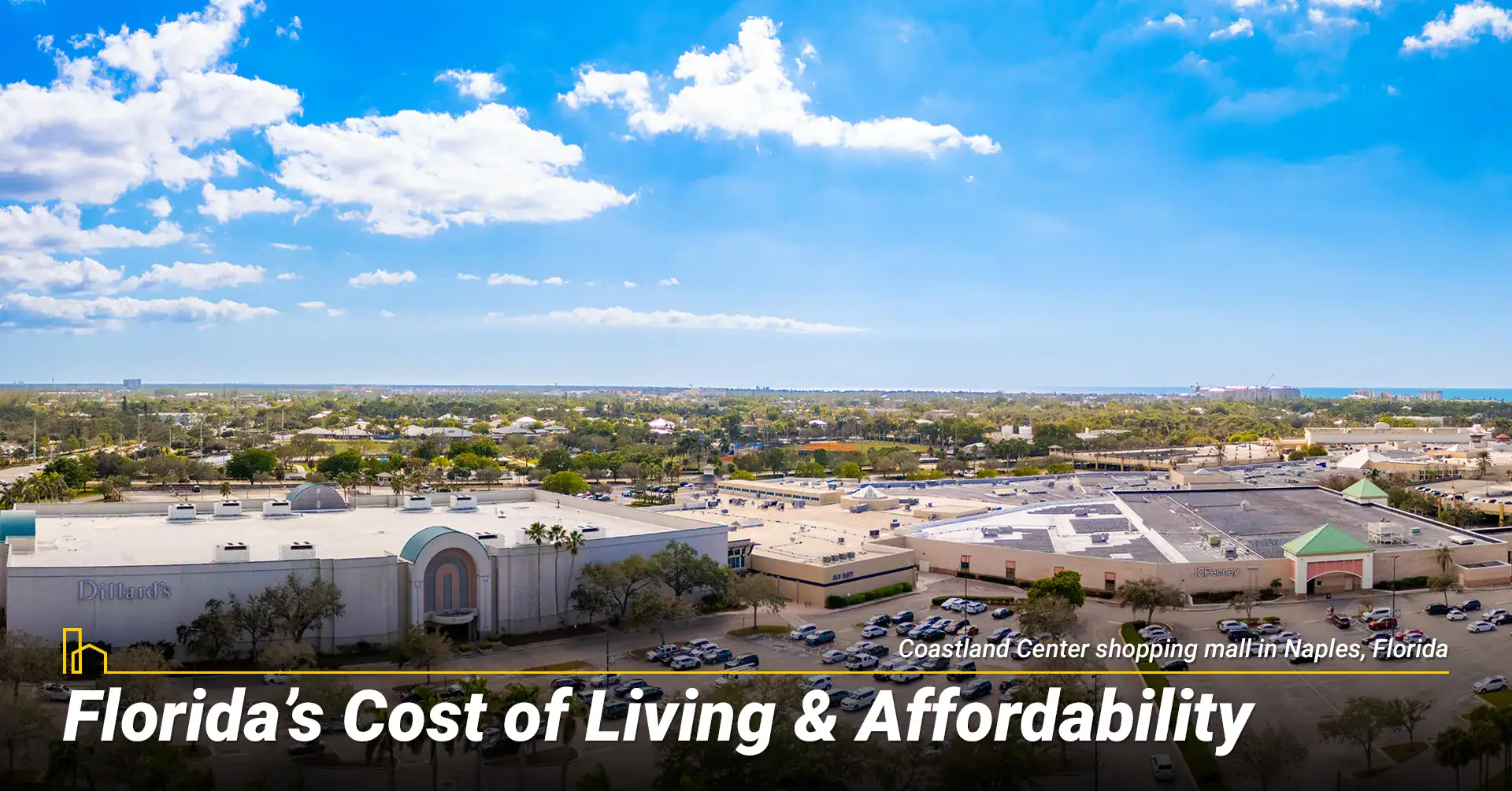
The Sunshine State’s cost of living is moderately higher than the national average—about 1.14 times higher according to recent economic data—but you’ll find living in Florida is still significantly more affordable than many parts of Massachusetts, especially when it comes to state and local taxes. The absence of state income tax, for one, provides substantial savings for most relocating families.
A. Florida’s Housing Market: An Overview
Florida’s housing market is as diverse and varied as the state itself, and it is competitive, with prices reflecting each city’s unique appeal, location, amenities, and proximity to beaches or major employment centers. The state’s continued population growth (18.8 percent growth since the 2010 census to nearly 24 million residents today) and desirability have driven housing demand, but opportunities still exist across different price points.
Here’s a comprehensive snapshot of median home prices and typical rental rates for one-bedroom, two-bedroom, and three-bedroom properties in Florida’s most popular relocation destinations:
| City/Region | Median Home Price | 1BR Rent | 2BR Rent | 3BR Rent (Apartment) | 3BR Rent (House) |
| Miami | $540,000+ | $2,300 | $3,000 | $3,500–$4,500 | $4,000–$6,000+ |
| Orlando | $385,000+ | $1,500 | $1,900 | $2,200–$2,800 | $2,500–$3,500 |
| Tampa | $400,000+ | $1,600 | $1,600 | $2,300–$3,000 | $2,800–$3,800 |
| St. Petersburg | $420,000+ | $1,700 | $2,200 | $2,400–$3,200 | $2,900–$4,000 |
| Jacksonville | $340,000+ | $1,300 | $1,700 | $1,800–$2,400 | $2,000–$2,800 |
| Naples | $800,000+ | $2,500 | $3,500 | $3,800–$5,000 | $4,500–$7,000+ |
Important Notes:
- 3BR Rent (Apartment): Reflects typical monthly rates for three-bedroom apartments in each metropolitan area
- 3BR Rent (House): Reflects typical monthly rates for three-bedroom single-family homes, which are often higher than apartments, especially in desirable neighborhoods or luxury markets
- Rental rates are current as of mid-2025 and can vary significantly by specific neighborhood, amenities, and property condition
- Naples represents a high-end luxury market with premium properties, so both apartment and house rental rates are at the top of the Florida range
Housing Market Insights: While Florida housing costs have risen in recent years due to increased demand, there are still plenty of affordable options—especially if you’re willing to live in suburban areas outside the major city centers. For example, suburbs around Orlando, Jacksonville, Fort Myers and Tampa often offer significantly lower prices and more space for growing families. If you’re looking for luxury waterfront living, Naples and Miami’s premium neighborhoods are top choices, but be prepared for premium prices that reflect their exclusivity and high demand.
5 Best Places to Live in Fort Lauderdale, Florida
This lovely region on Florida’s southeastern coast is gaining acclaim as a premier destination for families looking to plant roots in a locale that promises a high quality of life, economic prosperity, and a warm, inclusive community…
B. Utilities and Daily Living Expenses
Florida utilities, dominated by Florida Power and Light, are generally affordable compared to northern states, but air conditioning costs can significantly impact your electric bill during the hot summer months, and many residents simply opt to leave the AC on year-round. Here’s what you can expect to pay each month for essential utilities:
- Electricity costs range from $120–$200 monthly, with higher bills during summer’s almost mandatory air conditioning season.
- Water and sewer services typically cost $40–$70 per month, varying by municipality and usage.
- Internet and cable services range from $50–$100 monthly depending on speed and package options. In many newer apartment communities and home builds, cable TV is not available and has fully given way to internet and streaming services.
- Natural gas (if available for appliances) costs $20–$50 monthly for cooking and hot water heating.
Utility Cost Insights: Florida’s hot, humid summers mean air conditioning is essential for comfortable living, so factor those higher electricity costs into your monthly budget. Many newer homes and condominiums are built with energy-efficient features, ENERGY STAR appliances, and improved insulation to help keep utility costs manageable. If you’re relocating from a colder climate like Massachusetts, you’ll be pleasantly surprised by how little you’ll spend on heating costs year-round!
C. Groceries and Transportation Costs
Grocery costs in Florida are slightly higher than Massachusetts averages, but the difference is minimal and is more affected by food industry issues rather than local issues. You’ll typically spend about $250–$400 per person per month on food, with access to fresh tropical fruits, locally caught seafood, and year-round farmers markets, such as the legendary Yellow Green Farmers Market in Hollywood In terms of getting around, Florida’s transportation costs are generally lower than Massachusetts, especially if you live in cities with decent public transit systems or bike-friendly infrastructure. For the past couple of years, gas prices have generally hovered around $3per gallon throughout the state.
Cost of Living Insights: Florida’s year-round growing season means abundant fresh produce is always available at competitive prices, and you’ll find plenty of farmers markets and roadside fruit stands offering locally grown oranges, strawberries, and other seasonal specialties (don’t forget about the Crocodile Bites!). If you live near coastal areas, fresh seafood is plentiful and reasonably priced. Public transportation is most developed in Miami-Dade, Broward and Orange County (Orlando), but most Florida residents rely on personal vehicles for daily transportation needs, making great use of the state’s interstate system and Florida’s Turnpike stretching the length of the state.
7 Best Places to Live in Florida in 2025
Florida continues to attract a record number of newcomers with its diverse metropolitan markets offering something for everyone. From Naples' luxurious Gulf Coast lifestyle to Jacksonville's urban-suburban blend, from the military enclaves of Pensacola to the tourism destinations in Orlando, each locale provides unique advantages...3. Florida’s Economy and Career Opportunities
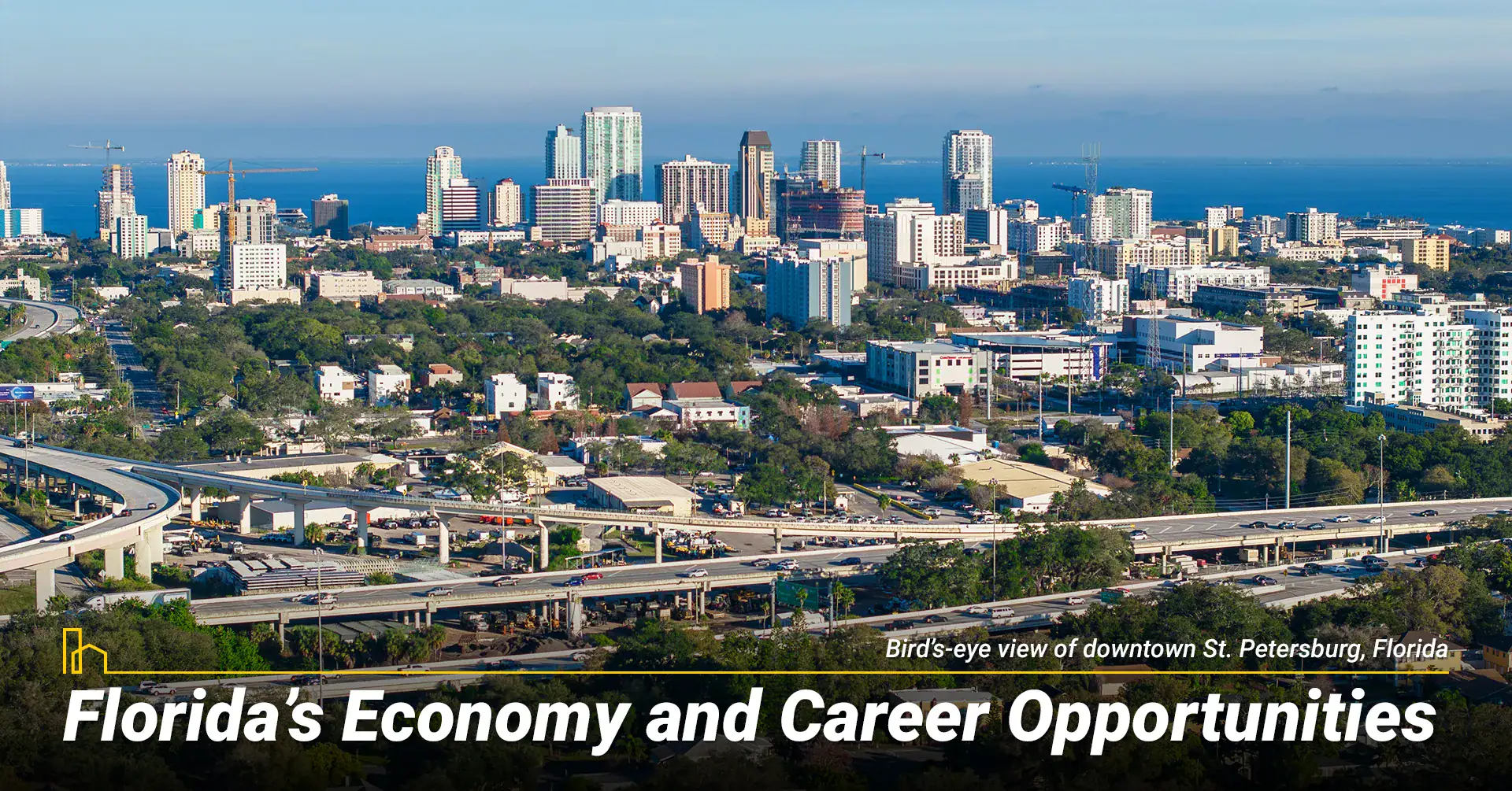
Florida’s highly diverse economy is experiencing robust growth, with job creation outpacing the national average and definitely keeping up with population growth. In early 2025, the state added more than 430,000 new jobs across multiple sectors, and the unemployment rate remains at historically low levels, checking in at just 3.7% in spring 2025. The state’s business-friendly environment, lack of personal income tax, and strategic location as a convenient gateway to the Americas make it an attractive destination for both established companies and emerging startups.
A. Major Industries and Employment Sectors
Florida’s diversified job market offers opportunities across numerous growing industries:
- Tourism and hospitality unsurprisingly remain the state’s largest industry, providing never-ending employment opportunities in hotels, restaurants, theme parks, cruise lines, and vacation rental management. This sector offers jobs ranging from i entry-level positions to executive management roles in world-renowned companies such as Disney, Darden, Carnival and Royal Caribbean.
- Healthcare and medical services represent one of Florida’s fastest-growing employment sectors, with hospitals, specialty clinics, senior care facilities, and medical research institutions constantly recruiting qualified professionals. The state’s aging population and continued growth drive consistent demand for healthcare workers, such as nurses, where Florida faces a shortage of 60,000 professionals in this field.
- Technology and innovation have transformed Florida into a major tech hub, with growing technology centers in Miami, Orlando, Tampa, and Jacksonville attracting software companies, startups, and established tech giants seeking lower operating costs and talented workforce. Tax incentives and a political emphasis on emerging industry workforce development have driven growth in the tech space.
- Education encompasses opportunities in Florida’s public and private K-12 schools, charter schools, colleges, universities, and educational technology companies. Florida’s growing population creates ongoing demand for teachers, administrators, and support staff across the educational spectrum, with a large network of both nonprofit and for-profit educational systems in the state
- Construction and real estate benefit from Florida’s continuous population growth and development boom, creating consistent demand for builders, contractors, architects, real estate agents, and property management professionals. Real estate contributed more than $394 billion to Florida’s economy last year!
- Industry Growth Insights: If you’re relocating from a professional background in Massachusetts, you’ll find excellent opportunities in healthcare, technology, banking and finance, and education. The tourism and service industries provide major employment but can be seasonal or part-time in some areas, so consider year-round stability when evaluating opportunities. Remote work is increasingly popular in Florida, thanks to excellent internet infrastructure, lower living costs, consistent traffic, and the appealing lifestyle that attracts digital nomads and remote workers.
7 Key Factors to Know About Living in Fort Myers, Florida
Whether you’re seeking the excitement of urban living or the tranquility of a suburban retreat, Fort Myers’ neighborhoods provide a spectrum of affordable living options without compromising on the joys and comforts of life…
B. Metropolitan Job Markets and Economic Centers
Here’s a comprehensive overview of employment opportunities in Florida’s major population centers:
| Metro Area | Key Industries | Notable Major Employers |
| Miami | International finance, tourism, technology, healthcare, trade | Baptist Health, Royal Caribbean, Univision, American Airlines, University of Miami/UHealth |
| Orlando | Tourism, technology, healthcare, education, aerospace | Walt Disney World, Universal Studios, AdventHealth, Lockheed Martin, Darden Restaurants |
| Tampa | Healthcare, finance, technology, hospitality, manufacturing | BayCare Health System, Raymond James, Tech Data, Busch Gardens, Moffitt Cancer Center |
| Jacksonville | Logistics, healthcare, finance, military, manufacturing | Mayo Clinic, CSX Transportation, Bank of America, Naval Air Station, Citigroup |
| St. Petersburg | Healthcare, technology, arts, finance, marine science | Johns Hopkins All Children’s Hospital, Raymond James, Duke Energy, Jabil |
Regional Job Market Insights: Each Florida major city offers its own unique employment advantages and industry concentrations. Miami serves as a major hub for international finance, trade, and business, while Orlando dominates in tourism and emerging technology sectors. The Tampa-St. Petersburg region creates a thriving bay area economy strong in healthcare and financial services, while Jacksonville functions as a major logistics and healthcare center with significant military presence. Research the specific job market in your chosen city to identify the best career opportunities for your professional background and goals.
Recommended for you
4. Florida’s Tradition of Educational Excellence
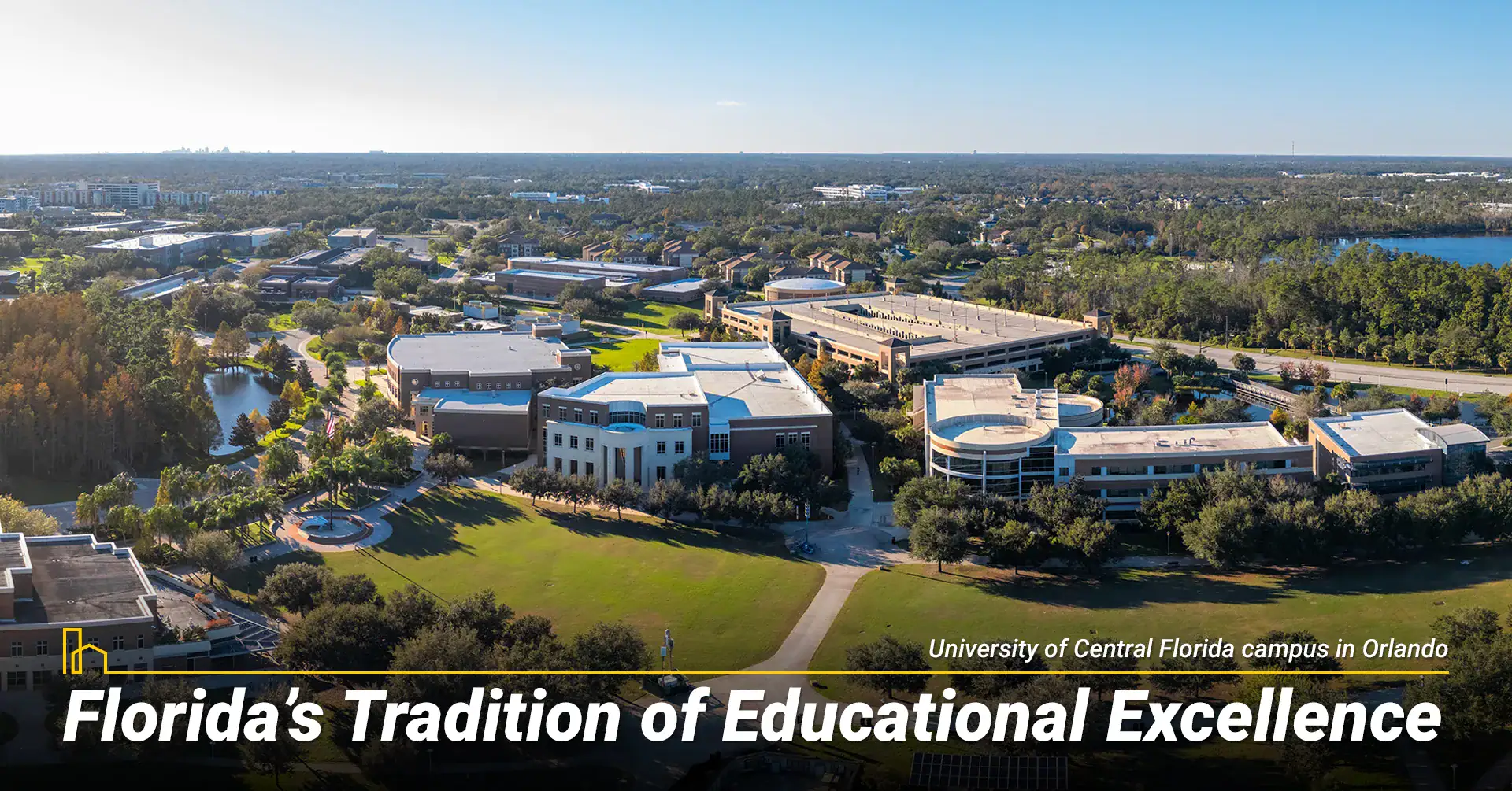
Florida’s education system offers strong performance with a diverse mix of high-quality public schools, private institutions and academies, and charter school options, as well as a comprehensive network of colleges and universities. The state has invested significantly in educational improvements and provides multiple pathways for student success, and a robust network of independent colleges and universities enhances academic excellence.
A. Public School System Performance
Florida’s public schools and universities have ranked No. 1 nationally in the U.S. News & World Report Best States education ranking for two years running. The state historically scores among the nation’s best, particularly in mathematics and reading achievement. Florida’s leadership also encourages and offers extensive school choice programs including traditional public schools, public charter schools, magnet programs, and virtual learning options, giving families flexibility to find the right educational fit for their children’s needs.
Educational Choice Insights: Florida’s comprehensive school choice system means you have numerous options beyond your local neighborhood school. Charter schools focus on specialized curricula such as technology or the arts (Indian River Charter High School in Vero Beach is nationally ranked in this category), magnet programs offer themed education like STEM or culinary education, and virtual schools provide online learning flexibility. This variety gives families unprecedented control over their children’s educational experience.
Affordable Assisted Living Places in Florida
Join us as we tour this beautiful state’s affordable communities offering a great place to retire while receiving high-quality assisted living care. The following sections will guide you through the choices available and the key factors you must consider, helping you make an informed decision about your or your loved one’s assisted living needs…
B. Higher Education Institutions and Opportunities
Florida is home to some of the country’s top-ranked universities and colleges, providing excellent higher education opportunities for students and families and attractive in-state tuition at public universities:
- University of Florida (Gainesville) ranks as one of the nation’s top public research universities with excellent academic programs and competitive SEC athletics.
- Florida State University (Tallahassee) is renowned for strong academics, research programs, and championship ACC athletics programs.
- University of Miami offers prestigious private university education with small class sizes and excellent faculty, and top-ranked medical and law schools
- University of Central Florida (Orlando) serves as one of the largest universities in the country with innovative programs and one of the world’s most diverse student bodies.
- Florida International University (Miami) provides world-class education with an incredibly diverse student population and strong research initiatives.
The state also features dozens of community colleges and technical schools throughout Florida, making it easy to find affordable pathways to higher education, career training, and professional development. Florida residents can also take advantage of the EASE grant, offering incentives for their college-age children to stay in-state for higher education.
Higher Education Insights: If you’re planning to further your education or have college-bound children, Florida offers an exceptional range of options at various price points. The state’s Bright Futures Scholarship program provides substantial financial aid for high-achieving Florida high school graduates, making college more affordable for resident families.
Affordable Places to Live in Naples, Florida
In this article, we aim to paint a comprehensive picture of Naples, highlighting its affordable neighborhoods and showcasing how this city beautifully blends cost-effective living with a high standard of life…
5. Florida’s Tax Structure Offers Major Financial Benefits
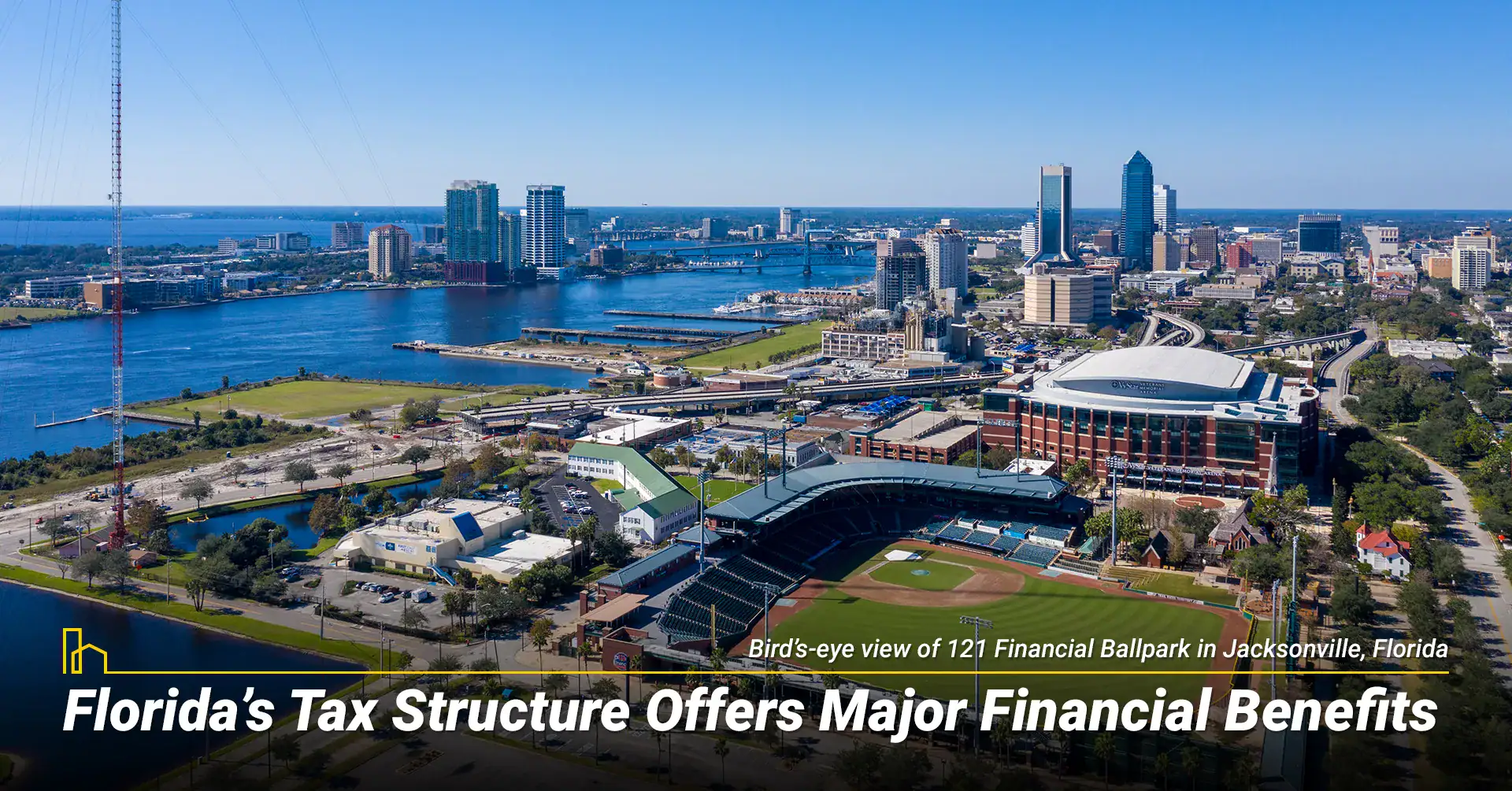
One of the most significant advantages of relocating to Florida is the favorable tax structure that can result in substantially increased take-home pay, especially for families moving from high-tax states like Massachusetts.
- No State Income Tax: You read that correctly! Florida does not impose any personal income tax, meaning you keep more of your earned income, retirement distributions, and investment gains.
- Sales Tax: Florida levies a 6% state sales tax, plus local municipal add-ons that typically range from 1–2%, for a total sales tax generally between 7-8%. Florida’s sales tax applies to most goods and services, with notable exceptions for groceries and prescription medications.
- Property Tax: Based on assessed market value with generous homestead exemptions available for primary residences, which can significantly reduce property tax obligations for Florida residents in many municipalities.
- This favorable tax environment means you’ll keep substantially more of your paycheck, and retirement income will stretch much further than in higher-tax states.
- Tax Benefits Insights: If you’re relocating from a high-tax state like Massachusetts, you’ll immediately notice a significant difference in your net pay due to the absence of state income tax. While property taxes and insurance costs can be higher in certain desirable areas, the lack of state income tax and reasonable sales tax typically more than compensates for these expenses for most middle-class and upper-income families.
The 3 Most Affordable and Safest Neighborhoods to Call Home in Miami, Florida
Miami’s neighborhoods of Kendall, Westchester, and The Hammocks are among the cheapest places to live in the city. Each offers safe, affordable living with its own charm—Kendall’s rising home values, Westchester’s cultural richness, and The Hammocks’ natural appeal—making them ideal for budget-conscious residents seeking quality and security…
6. Best Places to Live: A Comprehensive City Guide
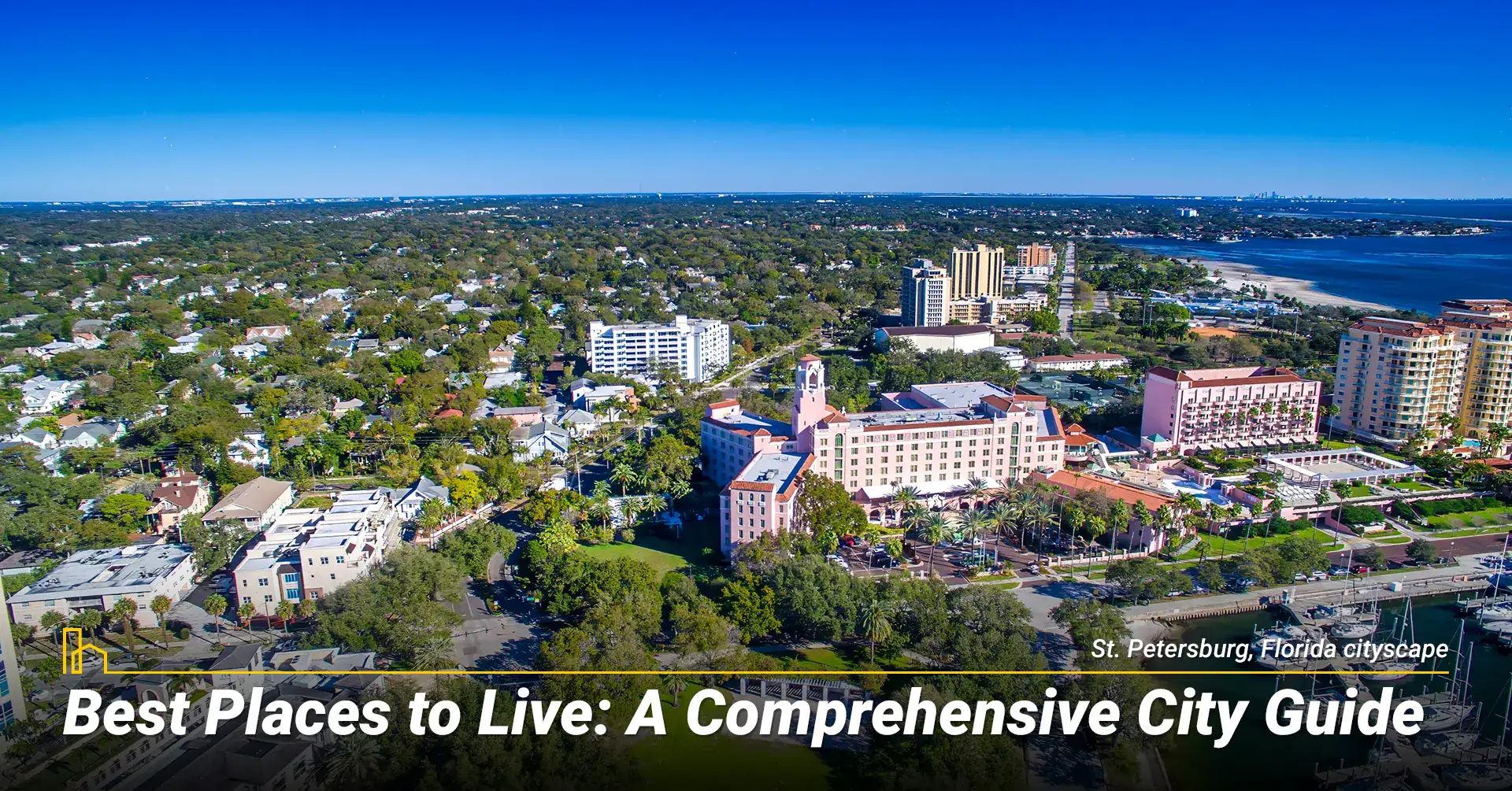
A. Miami: Urban Sophistication and International Beach Life
Miami is a vibrant, multicultural city with world-class dining, nightlife, arts, and culture. Living up to its moniker, The Magic City, it’s the perfect place if you want to live in a bustling, nonstop growing metro with easy access to beautiful beaches, international business opportunities as a gateway to Latin American markets, and year-round sports and entertainment.
- Miami Benefits: Strong job market in finance and international trade, incredible cultural diversity with global influences, a distinctive neighborhood system, acclaimed restaurants and a legendary nightlife scene, world-class art museums and galleries, beautiful beaches, and waterfront lifestyle.
- Miami Considerations: High housing costs resulting in a competitive rental market, heavy traffic congestion and limited parking, potential language barriers, and elevated hurricane risk during summer/fall months.
- Miami Living Insights: Miami is an excellent choice for young professionals, international business professionals, and anyone who loves cosmopolitan city life. The international atmosphere and endless entertainment options make it a unique place to call home, though the cost of living requires careful budgeting and strategy.
B. Orlando: Family-Friendly and Theme Park Central
Orlando is famous worldwide for its theme parks, which attracted more than 75 million visitors in 2024, but it’s also an outstanding place for permanent residents, with affordable family housing options, top-rated school districts, and growing sectors in technology, education and healthcare that provide diverse career opportunities.
- Orlando Benefits: Family-friendly suburban communities and amenities, a strong job market in tourism and technology, abundant entertainment and recreational options, and affordable housing compared to other major Florida cities.
- Orlando Considerations: Tourist crowds in certain areas year-round, hot summer weather with more humidity than on the coasts.
- Orlando Living Insights: Orlando’s vast network of suburbs offers excellent value for growing families, and the city’s expanding technology, education and healthcare industries are creating high-paying career opportunities beyond the traditional tourism industry.
The 6 Affordable Places to Live in St. Petersburg, Florida
Join us as we uncover the motives why St. Petersburg, with its blend of affordability, diverse neighborhoods, and high quality of life, is becoming one of Florida’s most coveted destinations for living, working, and playing. We’ll then present the best St. Pete communities you’ll want to consider for your Florida home…
C. Tampa: Affordable Urban Living and Growing Economy
Tampa, one of the fastest-growing urban markets in America, offers an appealing mix of urban amenities and suburban charm, with a rapidly growing job market, diverse and affordable housing options, and excellent educational opportunities for families.
- Tampa Benefits: An affordable cost of living compared to other major Florida cities, a strong and diversified job market, excellent public and private schools, and beautiful waterfront and recreational opportunities.
- Tampa Considerations: Notoriously the state’s most vulnerable hurricane risk during peak season, humid summer weather conditions.
- Tampa Living Insights: Tampa is an outstanding choice for families and working professionals seeking a balanced lifestyle. The city’s scenic waterfront, thriving downtown, and numerous recreational opportunities provide an excellent quality of life.
D. St. Petersburg: Artsy and Relaxed Waterfront Living
St. Pete, the other half of the Tampa Bay area, is renowned for its vibrant arts scene, beautiful waterfront parks, and laid-back lifestyle. It’s an ideal choice if you prefer a slightly slower pace of life yet with plentiful cultural amenities and outdoor recreation.
- St. Petersburg Benefits: Affordable living costs, a thriving arts and culture scene featuring international artists and exhibitions, beautiful weather and waterfront location, walkable downtown area.
- St. Petersburg Considerations: In a well-worn hurricane path during peak season, limited public transportation options outside of water taxis.
- St. Petersburg Living Insights: St. Pete is perfect for retirees, artists, creative professionals, and anyone who wants to live near the water without the hustle and bustle of a major metropolitan area.
The 8 Best Places Near the Beach for Retirees in Florida
While some of these communities are affordable, others are more luxurious. We have presented options that will fit different budgets and needs, so there should be a choice for everyone…
E. Jacksonville: Big City Amenities with Small-Town Feel
Jacksonville, the heart of Duval County and just south of the Florida-Georgia border, is Florida’s largest city by geographic area, offering a unique combination of urban and sprawling, suburban neighborhoods that provide big-city amenities with a more relaxed, community-oriented atmosphere.
- Jacksonville Benefits: Affordable housing and cost of living, family-friendly communities, a strong and diverse job market, and less tourist congestion than other major Florida cities. Jacksonville Considerations: Massive urban layout requires driving, even across downtown, with limited public transit options.
- Jacksonville Living Insights: Jacksonville is an excellent choice if you want access to big-city amenities including NFL football cultural attractions, and career opportunities while maintaining a more relaxed, conservative, suburban lifestyle.
F. Naples: Upscale Luxury and Resort-Style Living
Naples is one of the world’s premier luxury destinations with pristine beaches, world-class golf courses and country clubs, upscale shopping downtown, and a sophisticated, resort-style lifestyle that attracts affluent retirees and professionals.
- Naples Benefits: Upscale, safe communities, beautiful beaches and recreational amenities, high-end shopping and dining in a compact downtown district and excellent healthcare facilities. Naples Considerations: High cost of living and expensive housing and rental markets, limited job market outside of service industries.
- Naples Living Insights: Naples is ideal for retirees, wealthy professionals, and anyone seeking a high-end, resort-like lifestyle with access to luxury amenities and pristine natural beauty.
The Pros and Cons of Living in Ave Maria, Florida
Nestled in the heart of Southwest Florida, Ave Maria stands as a beacon of faith community that embodies a unique blend of small-town charm and modern amenities. This meticulously planned community, built around the central feature of a striking oratory and adjacent to a university, offers a refreshing departure from the typical residential development.
7. Planning Your Massachusetts-to-Florida Move: A Detailed Timeline

| Timeline | Essential Tasks | Detailed Actions |
| 8-12 Weeks Before | Research & Initial Planning | Research Florida cities, neighborhoods, school districts, job markets; calculate comprehensive moving costs including housing, utilities, transportation; research Florida tax implications and benefits |
| 6-8 Weeks Before | Documentation & Logistics | Gather important documents (birth certificates, Social Security cards, medical records, school transcripts); research and book reputable moving companies; begin decluttering and packing non-essential items; research pet transportation requirements for Florida |
| 4-6 Weeks Before | Service Arrangements | Schedule utility connections (electricity, water, internet); research Florida auto insurance requirements; notify current utility providers of disconnect dates; arrange mail forwarding through USPS |
| 2-4 Weeks Before | Final Preparations | Confirm moving company details and timeline; prepare essentials box for first days in Florida; clean current home; arrange temporary lodging if needed; notify banks, employers, and important contacts of address change |
| Moving Week | Execution & Immediate Setup | Oversee professional movers or manage DIY move; conduct final walkthrough of previous home; travel to Florida with essential items and important documents |
| Upon Arrival | Official Transitions | Set up essential utilities and internet service; register vehicle within 30 days; obtain Florida driver’s license within 30 days; enroll children in Florida public, private or charter schools; register to vote in Florida |
Moving Planning Insights: Planning ahead is absolutely crucial to a smooth, stress-free relocation from the Bay State to the Sunshine State. Start researching your new city and identifying potential neighborhoods as early as possible, and don’t forget to budget adequately for moving expenses, security deposits, utility connections, and emergency funds for unexpected costs…and sunscreen!
=> Get the Relocation Guide & Checklist PDF — prepared for both Desktop and Mobile devices.
Florida Vehicle Registration, Licensing, and Voter Registration
🚗 Vehicle Registration & Licensing in Florida
Vehicle Registration | Requirement | Details | Cost/Timeline |
|---|---|---|---|
| Registration Deadline | Register within 10 days of establishing residency | Required for new residents who become employed, enroll children in public school, or establish residency | Within 10 days or late fees apply |
| Emissions Testing | Not required in Florida | No emissions tests statewide | N/A |
| Insurance Requirements | Proof of Florida insurance required before registration | Minimum: $10,000 PIP and $10,000 PDL | Must be active at time of registration |
| Out-of-State Vehicles | Must title and register in Florida | Submit out-of-state title, VIN verification, proof of identity, and insurance | $225 initial fee + standard registration fees |
| Electric Vehicle Fees | No separate EV fee (as of 2025) | Florida considering EV fees but not yet passed | N/A |
| Base Registration Fees | Based on vehicle weight | $14.50–$32.50 + $225 new resident fee + local taxes | Renew annually |
| New Vehicle Fees | Includes title, plate, and initial registration | VIN verification may be required | Up to ~$400 total (including title + plate) |
Driver’s License Transfer | Requirement | Details | Timeline/Notes |
|---|---|---|---|
| Grace Period | Can drive on out-of-state license | Valid for up to 30 days | Must transfer before expiration or within 30 days |
| Transfer Deadline | Obtain Florida license after residency | Must apply in person at DHSMV office | Within 30 days |
| Residency Proof | Two documents showing Florida address | Examples: lease, utility bill, bank statement | Required at time of application |
| Testing Requirements | No written or road tests if license is valid | Vision test required | Must surrender old license |
| Required Documents | Identity, SSN, proof of FL address | Also registration and insurance for any owned vehicle | Originals or certified copies required |
| License Surrender | Must surrender out-of-state license | Required to receive Florida license | Done during DHSMV visit |
🗳️ Voting & Voter Registration in Florida
Current Registration Requirements | Requirement | Details | Timeline |
|---|---|---|---|
| Registration Deadline | Must register before elections | 29 days before any election | Strict cutoff enforced |
| Registration Methods | Multiple options available | Online, in person at DMV or election office, or by mail | Valid Florida ID needed for online |
| Eligibility Criteria | Must meet all requirements | U.S. citizen, Florida resident, 18+ by Election Day, no disqualifying felony | Felony voting rights restored through forgiveness or full sentence completion |
Enacted Legislative Changes | Legislation | Status | Requirements | Impact |
|---|---|---|---|---|
| Senate Bill 7050 (2023) | Enacted | Adds ID requirements for mail ballots; restricts voter registration groups | Voter ID for vote-by-mail; third-party groups face increased fines and requirements | Compliance burdens increased; organizations must re-register each election cycle |
📋 Key Differences Between Vehicle and Driver’s License Requirements
Important Note: Vehicle registration and driver’s license transfers have different timelines:
- Vehicle Registration: Must be completed within 10 days of establishing residency
- Driver’s License Transfer: Must be completed within 30 days of establishing residency
📝 Additional Important Information
First-Time Voter Registration in Florida
Currently, Florida does not require proof of citizenship documents (such as passports or birth certificates) for voter registration. Applicants must:
- Verify U.S. citizenship under penalty of perjury
- Provide valid identification (Florida driver’s license, ID card, or last four digits of SSN)
- Meet all other eligibility requirements
Recent Legislative Activity
As of 2025, there have been federal proposals (such as the SAVE Act) requiring proof of citizenship for voter registration, but no such requirement has been enacted at the Florida state level. A similar Florida state bill (HB 1381) was introduced in 2025 but failed to advance.
Vehicle Registration for New Residents
New Florida residents should prioritize vehicle registration (10-day deadline) before driver’s license transfer (30-day deadline) to avoid penalties and ensure legal compliance.
Contact Information
- Florida DHSMV: For vehicle registration and driver’s license information
- Local Tax Collector: For vehicle registration services
- County Supervisor of Elections: For voter registration assistance
Last Updated: July 2025
The Pros and Cons of Living in Parrish, Florida
This town is a place for people of all ages to thrive. It caters excellently to families looking for a safe environment with good schools and to retirees searching for a calm yet engaging community to enjoy their years of leisure…
8. Settling In: Practical Essentials for New Floridians
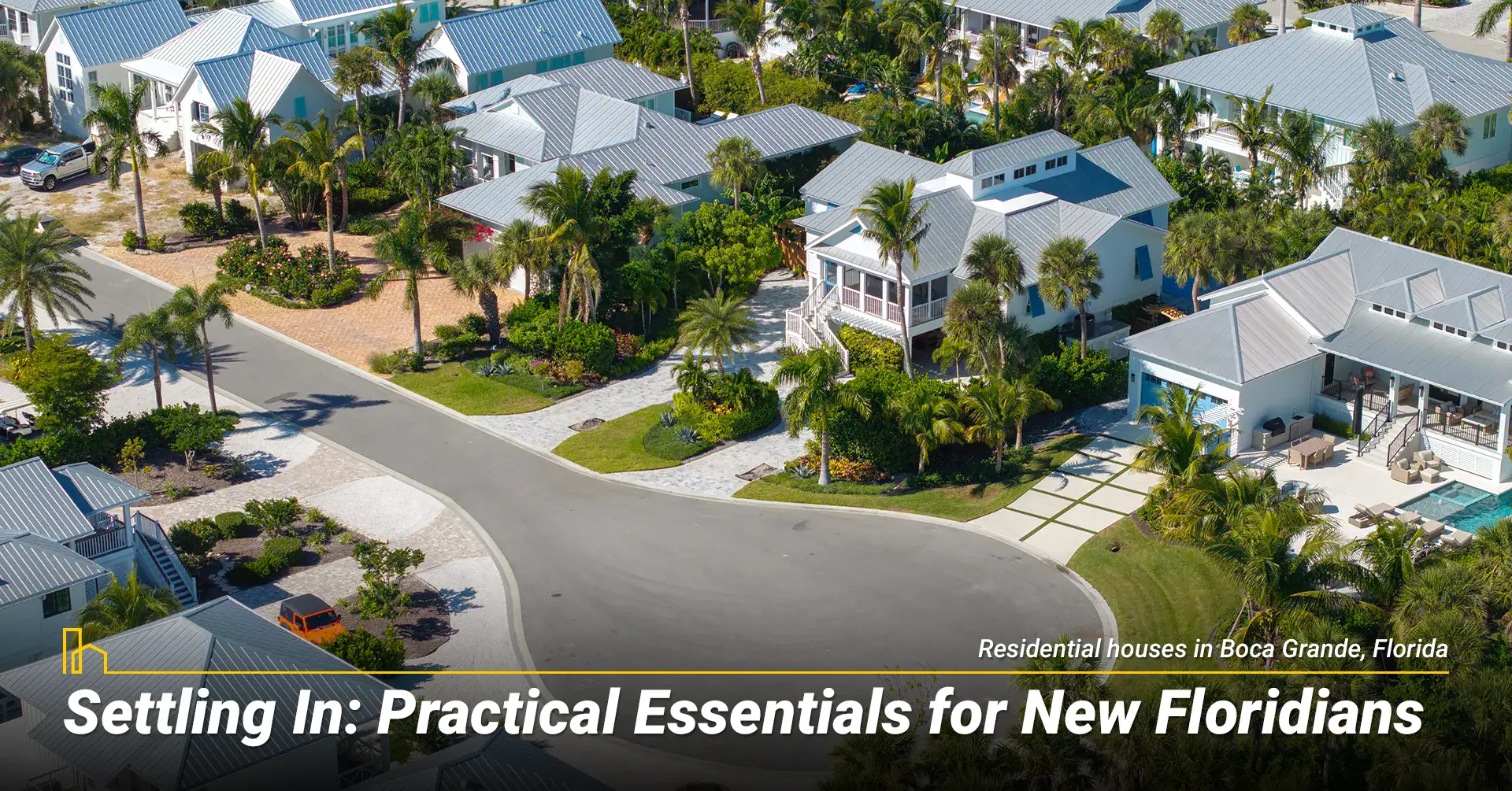
A. Utilities and Essential Services Setup
Florida utilities are managed by a combination of public and private providers, with service quality generally reliable throughout the state. Electricity and water are typically provided through municipal utilities or regional companies, while internet options include major providers like Xfinity, Spectrum, Optimum, and AT&T.
| Utility/Service | Provider Type | Typical Monthly Cost | Setup Notes |
| Electricity | Public/Private utilities | $120–$200 | Higher costs during summer air conditioning season |
| Water/Sewer | Municipal utilities | $40–$70 | Varies by region and usage patterns |
| Internet/Cable | Private providers | $50–$100 | Multiple high-speed options available |
Utility Setup Insights: Setting up utilities in Florida is generally straightforward and can often be done online for convenience. It’s wise to compare different providers and rate plans to find the best deals, although for electric and gas service you will generally utilize the service provider that handles your location. Many Florida cities offer online utility setup systems that streamline the connection process for new residents.
B. Legal Requirements and Official Documentation
Florida law requires new residents to complete several official tasks within specific timeframes to establish legal residency and comply with state vehicle and voting regulations.
| Requirement | Deadline/Details | Important Notes |
| Vehicle Registration | Within 30 days of establishing residency | Safety inspection required in most counties; bring out-of-state title, insurance proof, and identification |
| Driver’s License | Within 30 days of establishing residency | Written and road tests may be required depending on previous state; bring current license and required documents. You must make an online appointment through the FLHSMV website! |
| Voter Registration | As soon as possible after moving | Can be completed online through Florida Division of Elections website |
| Address Updates | Immediately upon moving | Notify all banks, insurance companies, employers, and service providers |
Legal Requirements Insights: Florida’s Department of Motor Vehicles can be quite busy, especially in high-growth areas, so scheduling an appointment online will save considerable time and is essentially the only way to obtain your new license and tag. Average appointment wait times are one month, so plan accordingly and don’t delay. Bring all required documentation, including proof of Florida residency and valid auto insurance that meets state minimum requirements.
C. Community Integration and Building Social Networks
The best way to feel right at home in Florida is to actively participate in local community life – whether it’s the local swimming pool or an activity, just jump in! Floridians are generally friendly and welcoming to newcomers who show genuine interest in getting involved and contributing to their new communities – remember, most of your new neighbors were new to Florida themselves once.
Community Integration Insights: Look for local community groups on social media platforms or neighborhood apps like Nextdoor to connect with your new neighbors and community. Volunteering for local charities, churches, schools, or community organizations is an excellent way to meet like-minded people while giving back to your new home state.
The Cost of Living in Florida vs. Texas: A Comprehensive Analysis
This analysis provides the foundation for making an informed decision based on your circumstances and priorities. Whether you choose Florida’s coastal charm or Texas’s economic opportunities, both states continue to attract new residents with their unique benefits and lifestyle advantages…
9. Florida’s Unique Rules and Requirements
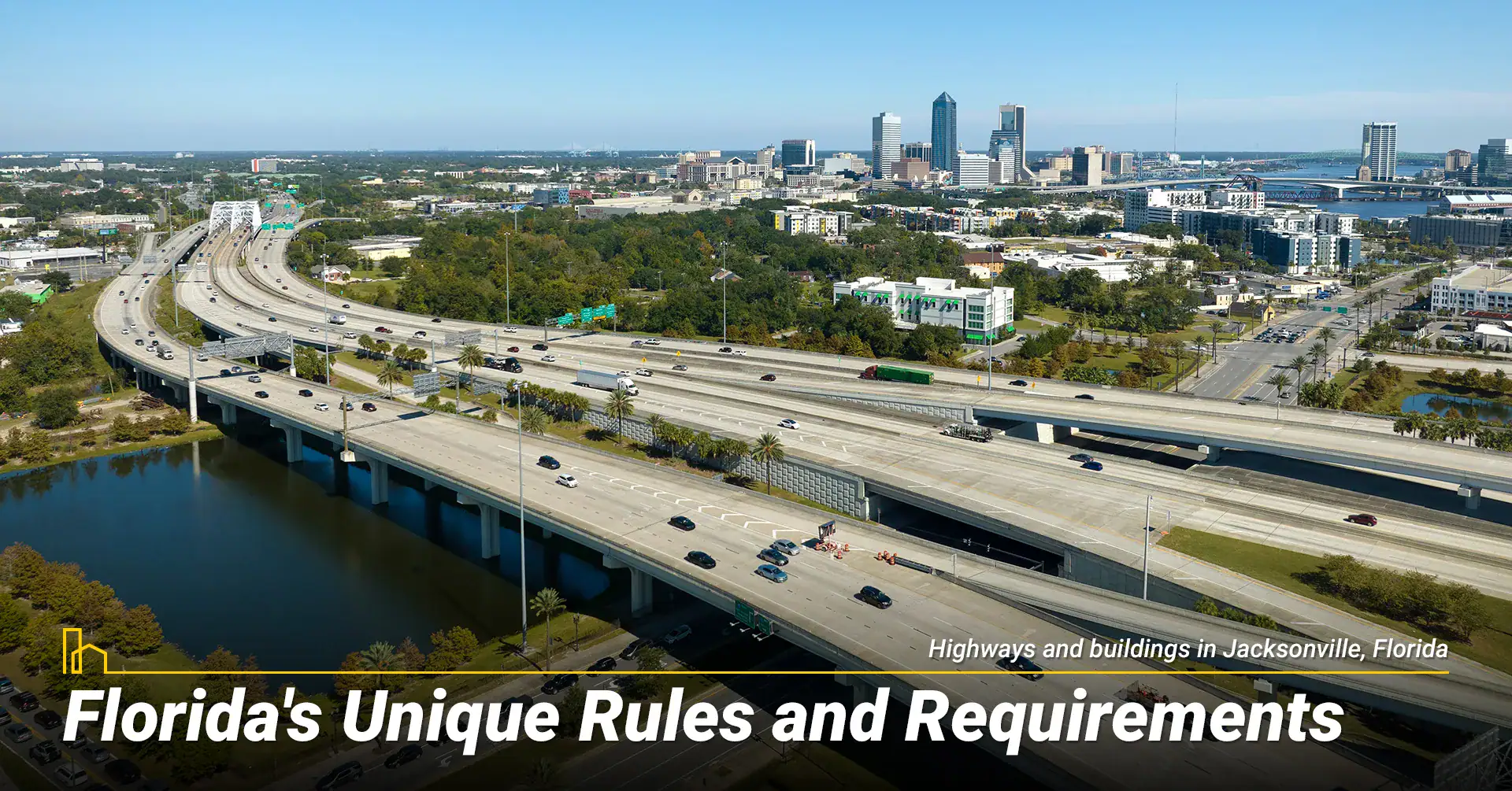
A. Vehicle Registration and Emission Standards
Florida requires all non-commercial motor vehicles (like your family car) to be registered within 30 days of establishing residency. Most counties require basic safety inspections, and certain metropolitan areas like Miami-Dade County have stricter emissions testing standards to maintain air quality.
Vehicle Registration Insights: Check your specific county’s requirements before visiting the DMV, as emission standards and inspection requirements can vary between counties. Some areas like Miami-Dade have more stringent environmental regulations than rural counties. And don’t forget to make your appointment via the FLHSMV website – you can’t be seen without one!
B. Residency Establishment and Documentation
You’re considered a Florida resident after living in the state for at least 180 days during any calendar year. However, you can establish residency earlier through specific actions that demonstrate intent to make Florida your permanent home.
Residency Establishment Insights: Establishing Florida residency is important for accessing in-state tuition rates, voting in local elections, and qualifying for various state benefits such as that all-important lack of state income tax. Keep detailed records of your relocation, including lease agreements, utility bills, and employment documents, to prove your residency status if needed.
12 Key Factors to Know About Living in Tampa, Florida
If you are considering a move to Tampa, you’ll find plenty of information here to help you make a wise decision. This article will cover Tampa’s climate, standard of living, health care, education, employment, leisure-time activities and more. Tampa’s livability score, as determined by…
10. Financial Adjustments and Budgeting for Florida Living
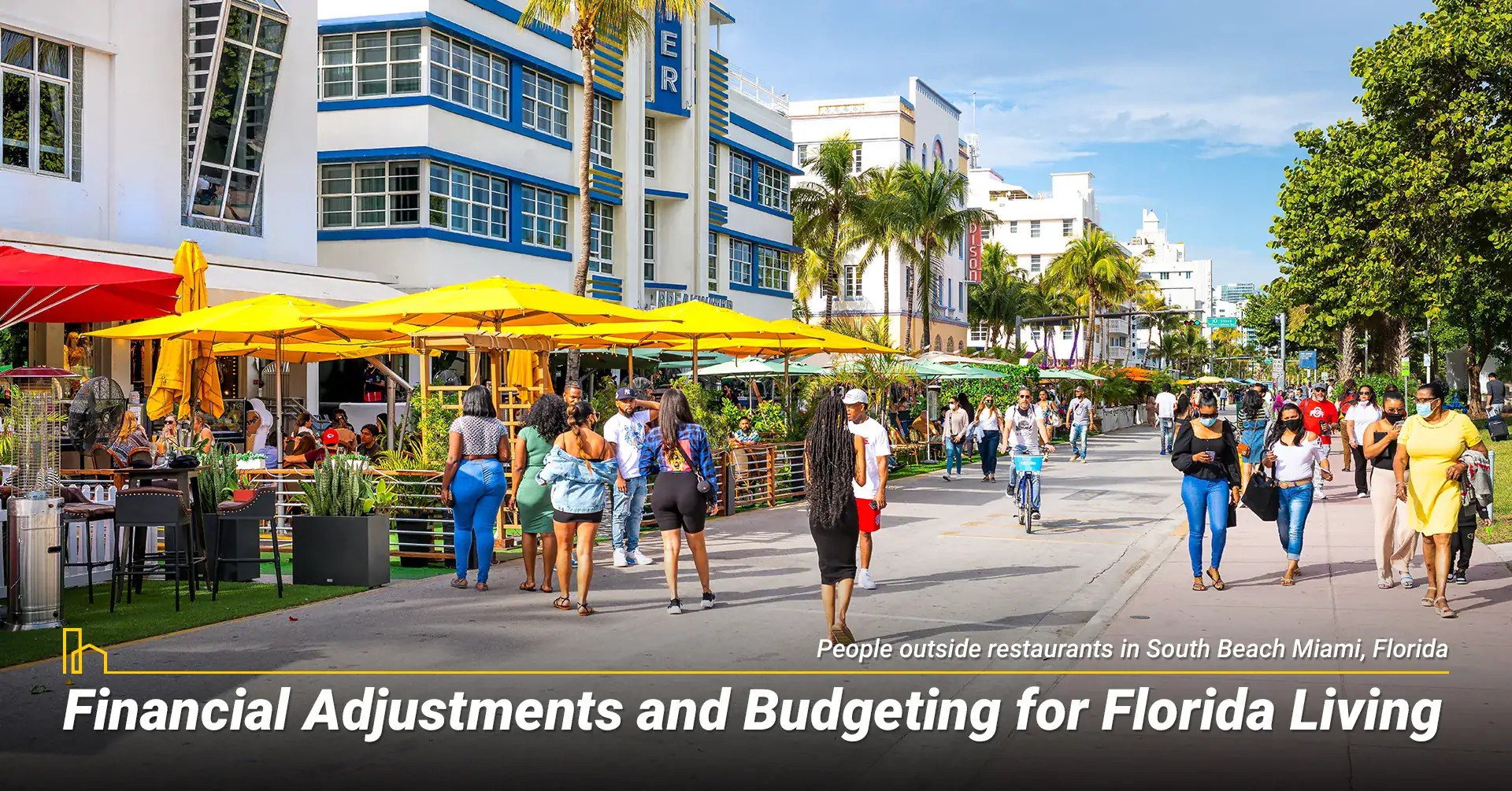
A. Cost of Living Comparison
Living in Florida costs approximately 14% more than the national average, primarily due to housing expenses in desirable coastal and metropolitan areas, as well as higher insurance costs (auto, flood, etc.). However, most utilities, groceries, and transportation costs are generally comparable to Massachusetts and other northern states, especially when you factor in the absence of state income tax.
B. Creating Your Florida Living Budget
| Expense Category | Estimated Cost Range | Planning Notes |
| Professional Movers | $1,000–$10,000+ | Varies by distance, services required, and volume of belongings |
| Security Deposits | 1–2 months’ rent | First month, last month, security deposit common for rentals |
| Utility Setup Fees | $100–$300 | Connection fees for electricity, water, internet services |
| Emergency Fund | 3–6 months’ expenses | Important safety net for unexpected costs during transition |
Budgeting Insights: Strategic budgeting for your Florida relocation is critical for a successful transition. Don’t forget to factor in expenses like moving insurance, pet relocation costs, temporary lodging, and vehicle registration fees when calculating your total moving budget.
Ready to Go? Your Florida Adventure Awaits!
Are you convinced to make the move to the Sunshine State? Florida is a special (and warm) place with incredible diversity, unlimited opportunities, and we’re excited that you’re considering so many others in our piece of paradise. Whether you’re looking for career advancement, family-friendly communities, the beach lifestyle, or simply a fresh start in a tropical climate, you’ll find it here. From our world-famous beaches and jaw-dropping sunsets to our thriving city centers and beautiful natural landscapes, there’s truly something for everyone in Florida.
The transition from cold Massachusetts winters to year-round sunshine, the financial benefits of no state income tax, and the welcoming neighbors and neighborhoods throughout the state make Florida an outstanding choice for your next adventure.
What are you waiting for? We can’t wait to welcome you home!
Recommended for you
Moving to Florida: Some FAQs
1. Do I Need a Car in Florida? You can get by without a car in some parts of downtown Miami and Orlando thanks to public transit systems, but coverage is limited, so most Florida residents rely on personal vehicles, especially in suburban areas and smaller towns. Most Florida metro areas were not designed with public transportation in mind.
2. How Safe Is Florida Compared to Other States? Florida is generally safe, especially in suburban communities and smaller towns. Like any state, some urban neighborhoods have higher crime rates, so it’s always smart to research specific areas before choosing where to live. Violent crime in Florida is traditionally lower than other states, although in some cities, property crime can trend somewhat higher.
3. What Are the Biggest Challenges for Florida Newcomers? Adjusting to the intense heat and humidity, preparing for and adapting through hurricane season, and building new social networks can be challenging initially. However, once you settle in and adapt to the climate, you’ll love the Florida lifestyle and find your new community to be very friendly
4. How Much Money Should I Budget for Moving to Florida? It’s a 1,200+ mile journey from the Bay State to the Sunshine State. Plan on spending $1,000–$10,000 or more on professional moving costs, depending on your distance and service requirements. Don’t forget to budget for security deposits, utility setup fees, and emergency funds for unexpected expenses.
5. Is Florida Really as Family-Friendly as People Say? Absolutely! Florida neighborhoods are generally safe, the public and private school systems are strong, and there are endless family activities including beaches, theme parks, nature preserves, and cultural attractions throughout the state. Florida is full of opportunities for families.
6. What’s the Weather Really Like in Florida Year-Round? Florida enjoys warm weather throughout the year, with hot, humid summers (80s-90s°F) and mild, pleasant winters, although you won’t initially think it’s winter at all, coming from Massachusetts (60s-70s°F). Hurricane season runs from June through November, requiring emergency preparedness.
The 9 Safest Places to Live in Florida
Get ready to explore some of Florida’s safest small communities for the affluents. From coastal towns to pleasant inland locations, there will surely be something for everyone who can afford the lifestyle…
7. What Steps Must I Take After Moving to Florida? Essential post-move tasks include registering your vehicle, obtaining a Florida driver’s license, updating your address with all service providers, and enrolling children in school. Don’t forget to notify your bank and insurance companies of your address change.
8. What Are the Pros and Cons of Florida’s No Income Tax Policy? No state income tax means significantly more money in your pocket each month, but property taxes and insurance costs can be higher than some states. Overall, most families find the tax savings more than offset other costs and will tell you that they experience more take-home pay.
9. Do Florida Residents Really Love Their Sports Teams? Yes! Florida has professional teams in all major sports including two NBA teams, two MLB teams, two NHL teams, and three NFL teams. College athletics are also extremely popular at all levels, with much fan and alumni loyalty to the SEC’s Florida Gators, and the ACC’s Florida State Seminoles and Miami Hurricanes.
10. How Do I Establish Residency in Florida? You’re considered a Florida resident after living here for more than 180 days in any calendar year. You can also establish residency earlier by renting or purchasing a home, obtaining employment, registering to vote, or enrolling children in Florida schools.
Table of Contents:
- 1. What is it REALLY Like to Live in Florida?
- 2. Florida’s Cost of Living & Affordability
- 3. Florida’s Economy and Career Opportunities
- 4. Florida’s Tradition of Educational Excellence
- 5. Florida’s Tax Structure Offers Major Financial Benefits
- 6. Best Places to Live: A Comprehensive City Guide
- A. Miami: Urban Sophistication and International Beach Life
- B. Orlando: Family-Friendly and Theme Park Central
- C. Tampa: Affordable Urban Living and Growing Economy
- D. St. Petersburg: Artsy and Relaxed Waterfront Living
- E. Jacksonville: Big City Amenities with Small-Town Feel
- F. Naples: Upscale Luxury and Resort-Style Living
- 7. Planning Your Massachusetts-to-Florida Move: A Detailed Timeline
- 8. Settling In: Practical Essentials for New Floridians
- 9. Florida’s Unique Rules and Requirements
- 10. Financial Adjustments and Budgeting for Florida Living
- Ready to Go? Your Florida Adventure Awaits!
- Moving to Florida: Some FAQs
Scott Koskoski, CFRE is a communications and brand positioning professional, and as co-founder and partner of two separate consultancies, partners with organizations in Florida and around the country to create messaging, storytelling, business development and external relations campaigns. A gifted writer, editor and speaker, Scott crafts insightful and relevant articles and is particularly passionate about helping people discover Florida, and other places he has lived and worked.
HOMEiA is a city guide site where visitors can find detailed information about communities of interest. HOMEiA’s City Guides, created in partnership with local writers and editors, are curated lists of the best, safest, and most affordable places to live. The guides feature the HOMEiA Score, a proprietary index that rates communities on such factors as housing costs, education, employment, etc.
HOMEiA.com aims to be the premier site for people planning to relocate, providing them with insightful content and connecting them with skilled real estate professionals.
We also empower real estate professionals to establish or strengthen their web presence by highlighting their experience, knowledge and achievements. If you’re selected to join our list of certified real estate professionals, you will distinguish yourself from your peers — and earn HOMEiA’s support.
If you believe in HOMEiA’s mission, please share our website with others.
Table of Contents:
- 1. What is it REALLY Like to Live in Florida?
- 2. Florida’s Cost of Living & Affordability
- 3. Florida’s Economy and Career Opportunities
- 4. Florida’s Tradition of Educational Excellence
- 5. Florida’s Tax Structure Offers Major Financial Benefits
- 6. Best Places to Live: A Comprehensive City Guide
- A. Miami: Urban Sophistication and International Beach Life
- B. Orlando: Family-Friendly and Theme Park Central
- C. Tampa: Affordable Urban Living and Growing Economy
- D. St. Petersburg: Artsy and Relaxed Waterfront Living
- E. Jacksonville: Big City Amenities with Small-Town Feel
- F. Naples: Upscale Luxury and Resort-Style Living
- 7. Planning Your Massachusetts-to-Florida Move: A Detailed Timeline
- 8. Settling In: Practical Essentials for New Floridians
- 9. Florida’s Unique Rules and Requirements
- 10. Financial Adjustments and Budgeting for Florida Living
- Ready to Go? Your Florida Adventure Awaits!
- Moving to Florida: Some FAQs









